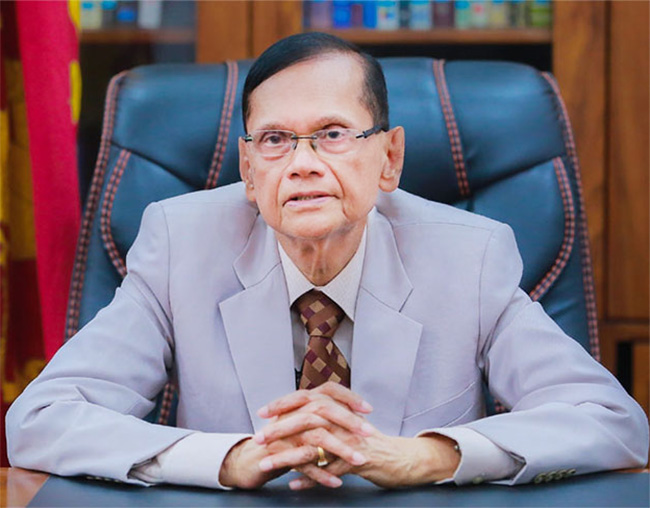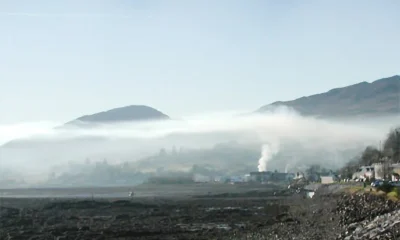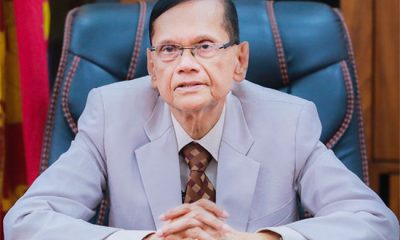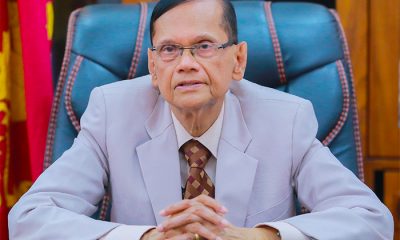News
Opp. says onus on EC to call prez polls, warns against govt. intervention

By Shamindra Ferdinando
Dissident SLPP MP Prof. G. L Peiris yesterday (25) said the onus was on the Election Commission (EC) to announce the presidential election on July 17, 2024, even if the Wickremesinghe-Rajapaksa government advanced the parliamentary election.
Addressing the media at his Kirula Place residence, the former External Affairs Minister said that the country expected the EC to act in terms of the presidential election law.
Therefore, there couldn’t be any ambiguity regarding the EC having to conduct presidential elections between Sept 19 and Oct 17, 2024, though the media reported contradictory statements, Prof. Peiris said.
As the current Parliament had completed two and half years of its five-year term, President Wickremesinghe could dissolve it, Prof. Peiris said. Otherwise, the Parliament could endorse a motion calling for early general election and submit it to President Wickremesinghe, Prof. Peiris said.
In terms of Article 70 of the Constitution, the relevant motion should have the backing of the majority of MPs at the time a vote was taken on the motion, Prof. Peiris said, adding that it could be adopted even without the consent of a simple majority in Parliament.
Prof. Peiris dealt with the issue at hand in the wake of continuing disagreement between President Wickremesinghe and the SLPP over advancing the general election ahead of the presidential polls.
UNP leader Wickremesinghe has indicated that the presidential polls would be held first.
Prof. Peiris said that the Opposition wasn’t interested in the ongoing dispute at all. “We want the EC to fulfil its constitutional responsibility by making the announcement as stipulated in the presidential election law,” he said. Recently the former switched his allegiance to the main Opposition Samagi Jana Balawegaya (SJB).
Alleging that President Wickremesinghe and the SLPP feared facing the electorate, Prof. Peiris said that the Opposition expected the current dispensation not to pursue strategies meant to put off presidential polls.
“If parliamentary polls are advanced, President Wickremesinghe will have to take necessary measures to release the required funds from the Consolidated Fund. Rs 10 bn allocated through the 2024 Budget cannot under any circumstances be utilized fully or in part to fund parliamentary polls,” Prof Peiris said.
Referring to the sabotaging of Local Government polls on the false claim of not having required funds, Prof. Peiris urged the government not to seek to put off elections pending electoral reforms. Justice Minister Dr. Wijeyadasa Rajapakse, PC, recently proposed that 160 of the 225 MPs in Parliament be elected by the first- past-the-post electorate by electorate system, and the remaining 65 chosen proportionally, either at national or provincial level.
Prof. Peiris said that the Opposition expected the government to conduct elections on time without making silly attempts to put them off through fraudulent means.
Commenting on former President and incumbent SLFP leader Maithripala Sirisena’s recent disclosure that he knew the mastermind of the 2019 Easter Sunday carnage, Prof. Peiris emphasized such claims should be examined, taking into consideration the political environment.
Was he telling the truth or just trying to exploit the heinous crime for some sort of a political advantage, the former Minister asked. The SLPP National List MP questioned the conduct of the former President who was yet to fully pay compensation amounting to Rs 100 mn ordered by the Supreme Court.
Prof. Peiris said that MP Sirisena through his actions brought the Office of the President to disrepute. Responding to a media query, Prof. Peiris said that as a former President, lawmaker Sirisena didn’t enjoy immunity and was now subjected to normal procedures of the law like any other citizen.
Referring to MP Sirisena’s subsequent claim that he received fresh information regarding the mastermind three weeks ago, Prof. Peiris said that the former Defence Minister should have got in touch with the relevant authorities immediately without playing coy about it.
News
Prime Minister inaugurates the 2025 Buddha Rashmi Vesak Zone

The 2025 Buddha Rashmi Vesak Zone, jointly organized by the Hunupitiya Gangaramaya Temple, the Presidential Secretariat, and the Prime Minister’s Office, was ceremonially inaugurated on May 12 by Prime Minister Dr. Harini Amarasuriya.
During the opening ceremony, the Prime Minister shared the following thoughts:
“The Buddha Rashmi Vesak Festival, held with the collective effort of all communities residing in the city of Colombo, is truly special. The religious harmony that exists within Colombo plays a significant role in making this event successful. Thanks to this harmony, we witness a large number of Dansals and Vesak festivities. These Dansals are organized through the collective efforts of people across the city, who contribute both financially and physically to make them possible.
The efforts made by the Chief Incumbent of the Gangaramaya Temple, Venerable Kirinde Assaji Thero, to nurture Sri Lankan Buddhist enlightenment, Buddhist culture, and national identity not only among local Buddhists community but also to foreign Buddhists community and international visitors, must be sincerely appreciated.
At this moment, I also remember with deep sorrow those who lost their lives in yesterday’s tragic bus accident in the Kotmale area, and I extend heartfelt sympathies to their families. I also wish a speedy recovery to those who were injured.”
The event was attended by Minister of Buddha Sasana, Religious and Cultural Affairs, Hiniduma Sunil Senevi, High Commissioner of India, His Excellency Santosh Jha and other High Commissioners and Ambassadors including Secretary to the Prime Minister, Mr. Pradeep Saputhanthri and a distinguished gathering of guests.
(Prime Minister’s Media Division)
News
Expert: Mismanagement of CEB hydro resources increases costly oil-powered electricity generation

The Ceylon Electricity Board (CEB) is in one of the strongest hydro storage positions in recent memory, but it has mismanaged key hydropower complexes, causing an increase in oil-powered electricity generation and and costs.
Energy expert Dr. Vidura Ralapanawe has raised serious concerns over CEB’s operational decisions, particularly the skewed use of the Mahaweli and Laxapana hydropower complexes. “By mid-May, the system had ample storage — about 60% overall — which is actually a very good position to be in just before the South-West monsoon rains,” he said. “But within that headline figure is a huge imbalance. Mahaweli reservoirs are near 75%, while Laxapana is languishing at 30%.”
This lopsided storage has already caused direct operational problems. The Canyon power station, which is fed by the Maussakele Reservoir in the Laxapana complex, has been forced to reduce its output. The 60MW plant is now operating at just 40MW due to limited water availability. Downstream, the 100MW New Laxapana station is similarly constrained.
The Laxapana complex is not just another hydropower asset — it plays a vital role in Colombo’s drinking water supply. It is required to run continuously to maintain flows for water treatment plants. “That means the CEB must generate from Laxapana 24/7, no matter what,” Ralapanawe said. “So how did they allow it to reach such a critically low level, especially when Mahaweli reservoirs are full?”
Ralpanawe said: “Instead of making adjustments to maintain operational flexibility, the CEB appears to have run the Laxapana complex harder than necessary in previous months while underutilising Mahaweli, where Victoria and Randenigala are sitting comfortably. The consequence? More reliance on oil-based thermal generation, even as the country’s dams remain well-stocked.”
“This is not just a technical problem — it’s an economic one,” he stressed. “Oil is expensive. When you underutilise hydropower in a year like this, you’re actively choosing to drive up the cost of generation.”
The apparent lack of coordination between the Mahaweli and Laxapana systems is especially baffling given the CEB’s long-standing familiarity with both. “The CEB has operated these systems for over 40 years. They know the inflows, the rainfall patterns, the seasonal irrigation releases — none of this is new,” Ralapanawe said.
Moreover, the growing integration of AI and data-driven forecasting tools in the global energy sector makes such mismanagement increasingly indefensible. “If, in the age of AI, we’re still hearing that ‘it’s too complex’ to manage these reservoirs in tandem, then something is seriously wrong,” he added.
Dr. Ralapanawe urges the CEB to provide an explanation: “Why was Mahaweli underdispatched when it was full? Why was Laxapana overused to the point that we now can’t get full capacity from critical plants like Canyon and New Laxapana? What is the economic impact of burning more oil than necessary?”
The missteps are already costing the public. Higher generation costs will ultimately be passed on to consumers in the form of increased tariffs, a burden made heavier in an already strained economy,” says Dr. Ralapanawe.
Ironically, 2025 was shaping up to be a strong hydro year, offering a rare opportunity for cost savings and reduced fossil fuel use. Instead, mismanagement has left key reservoirs unbalanced and locked the system into a more expensive operating mode — one that benefits oil suppliers but punishes the average household and industry.
Dr. Ralapanawe’s message is blunt: “This is not just about water and electricity. This is about public accountability and economic responsibility. If the CEB cannot manage two hydro systems properly with decades of data at its fingertips, then it must rethink its leadership and planning structures — or risk repeating the same costly mistakes year after year.”
Our efforts to contact CEB officials for comment were in vain.
By Ifham Nizam
News
Million Lankan women workers will lose their jobs if Trump’s 44 % tariff goes into effect

As many as a million Lankan women workers in key export sectors will lose their jobs and income if the 44 percent tariffs imposed by US President Donald Trump come into force at the end of the 90-day pause, Asia News has reported.
Sri Lanka’s main export industries, such as apparel, tea, gems, rubber and cinnamon, that employ mostly women, will be the most affected by the new tariffs since the US market is one of their most lucrative.
Apparel workers reproach the government for its “lethargic attitude” and failure to consider the concerns of workers and unions, not least because their representatives were not asked to participate in the discussions on tariffs.
The apparel industry accounts for about 40 percent of the country’s total exports, and is crucial for its economy. It also employs mainly women from low-income backgrounds in rural areas, for whom these jobs represent a crucial pathway out of poverty.
Since most apparel workers are also breadwinners, their wages help extended family networks in economically disadvantaged regions.
“The Women’s Centre collaborated with 25 other women’s organisations to carry out our campaign against the US tariffs hindering women workers,” said its Executive Director, Padmini Weerasuriya.
If the tariffs go into effect, “Their take-home pay will decrease significantly,” she added. “As orders dip and approximately six million dependents will also be severely impacted.”
“These women need job security as factories are already discussing about possible layoffs of workers, since demand is likely to drop.”
Compared to India and Bangladesh, she warns, Sri Lankan women face greater competition since “the tariffs imposed on Sri Lanka are higher”. That is why several manufacturers are already moving their operations to Vietnam, Bangladesh and Africa.
If plants shut down, more than 350,000 women working will be impacted. AsiaNews met three of them, 33-year-old Subadra Aponsu, 31-year-old Hemamamli Akaravita and 30-year-old Sandamini Tissera who spoke about their difficulties.
“We are the breadwinners of our families as our parents are elderly and sick. Our siblings are married and they are unable to provide for our parents. During the past several years, we have been working hard and providing for our families. If we lose our jobs, we have no option but to mortgage our homes,” they explained.
“During the economic crisis, we had to sell our paddy fields. Currently, our employers are planning to leave the country. We may lose our jobs shortly. We are unable to find employment elsewhere as almost every apparel manufacturer is planning to sell their business. In our boarding house, several women have already lost their jobs.”
According to economic analysts Sampath Amarasinghe and Niroshini Caldera, “due to the new tariffs, there will be a significant decline in export volumes with a severe erosion of Sri Lankan goods’ competitiveness in US markets.” All this, they warn, could result in “many Sri Lankan products ending up out of reach for US consumers and businesses.”
The greatest risk concerns “price- and cost-sensitive categories like garments, where profit margins are already low and competition from other countries is intense.”
The new tariff will see exports to the United States drop by 20 percent, with an annual loss of about US$ 300 million in foreign currency earnings.
As Sri Lanka’s total exports of goods in 2024 reached US$ 13 billion, the experts conclude, this represents “a major blow to the country’s balance of trade” and “economic growth prospects”.
Meanwhile, several women’s groups started a petition last week in the Katunayake Free Trade Zone (the first and largest of the country’s eight FTZs). – (AsiaNews)
-

 Latest News6 days ago
Latest News6 days agoNPP win Maharagama Urban Council
-

 Features3 days ago
Features3 days agoSAITM Graduates Overcome Adversity, Excel Despite Challenges
-

 Business6 days ago
Business6 days agoJohn Keells Properties and MullenLowe unveil “Minutes Away”
-

 Sports3 days ago
Sports3 days agoASBC Asian U22 and Youth Boxing Championships from Monday
-

 News3 days ago
News3 days agoDestined to be pope:Brother says Leo XIV always wanted to be a priest
-

 Foreign News4 days ago
Foreign News4 days agoMexico sues Google over ‘Gulf of America’ name change
-

 Opinion6 days ago
Opinion6 days agoRatmalana: An international airport without modern navigational and landing aids
-

 Opinion3 days ago
Opinion3 days agoDrs. Navaratnam’s consultation fee three rupees NOT Rs. 300
















